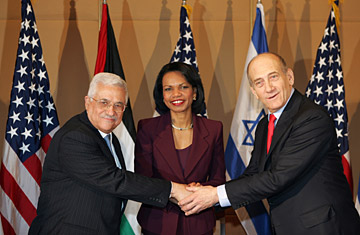
Secretary of State Condoleezza Rice with Israeli Prime Minister Ehud Olmert, right, and Palestinian President Mahmoud Abbas, left, February 19, 2007.
The task of persuading the Israelis and the Palestinians to renew peace talks, never easy, is now complicated by the Palestinians' new "national unity" government, which will be dominated by the militant organization Hamas. Earlier, Rice had exhibited discretion, saying she would withhold judgment on the controversial Palestinian government until it is formed in five weeks. But her caution, and any leeway for bargaining, was undercut by news from Washington. Soon after her arrival in Jerusalem on Saturday, the Israeli press reported that President George W. Bush already had assured Olmert that the U.S. will never deal with the new government until Hamas softens its stance by recognizing the Jewish state's right to exist and renouncing violence. That is an apparent reflection of an important faction in the Administration — one led by Vice President Dick Cheney — that has been urging Rice to express disapproval of the "unity" government. Asked about the Olmert-Bush conversation, Rice said, "I am not going to get into what private discussions were between the President and the Prime Minister. I will just tell you that U.S. policy on this is very clear and I know that's what the President thinks about this, and we're going to wait until there's a government."
She is also under pressure from the Europeans and moderate Arab states to coax Israel into meeting the Palestinians halfway. The Europeans, along with Russia and the United Nations — all members, along with the U.S., of the "Quartet" mediating the Israeli-Palestinian conflict — see Hamas' decision to "respect" past agreements between the Palestinian Authority and the Jewish state as a softening of their death-to-Israel stance. And the conservative, Sunni-led Arab governments have let Rice know that if the U.S. doesn't make a concerted effort to end the festering misery in the Palestinian territories, it will be much more difficult for them to respond to American entreaties to help stabilize Iraq and Lebanon and to contain the radical influences of Iran and Syria.
Meanwhile, Saudi Arabia, Jordan and Egypt have been expecting the U.S. and Israel to make some significant positive moves. In talks with U.S. diplomats, they argue that the Saudi-brokered accord that helped forge the unity government gives Abbas some room to negotiate on behalf of all Palestinians — including Hamas — and the Israelis and Americans should take him up on that. The Arab diplomats also stress that if Olmert is prepared to make major concessions, such as a withdrawal from Jewish settlements in the West Bank, it could lay the groundwork for a lasting peace between Israel and its Arab neighbors.
The odds may be against Rice, but as one Middle East expert in Washington says, "they're not at zero." On arrival in Israel, Rice let it be known that she expected rough weather at the summit, but was determined to press ahead anyway. She told reporters, "despite the complications... it's an important time to talk about how we advance the vision of two states living side by side in peace and freedom."
However, neither Olmert nor Abbas are in a talkative mood — not for a while. Olmert's popularity is scraping the floor at 14%, and persuading Israelis that he should negotiate with a new Palestinian government containing Hamas — terrorists, in most Israelis' eyes — will be a hard sell. Meanwhile, Abbas has been telling Rice's aides, shuttling back and forth between Jerusalem to Ramallah in armored cars, that "he wants something to sell to the Palestinian people" before he will begin discussing the deeper issues of co-existence between Palestinians and Israelis. For starters, Abbas wants Olmert to return an estimated $500 million in Palestinian tax money, lift some of the 400 Israeli roadblocks in the West Bank and halt the expansion of Jewish settlements in the disputed territories. Otherwise, says one presidential aide, "how can we persuade the Palestinians that they can gain anything from peace with the Israelis?" with reporting by Scott Macleod/Cairo, Jamil Hamad/Ramallah and Aaron J. Klein/Jerusalem
